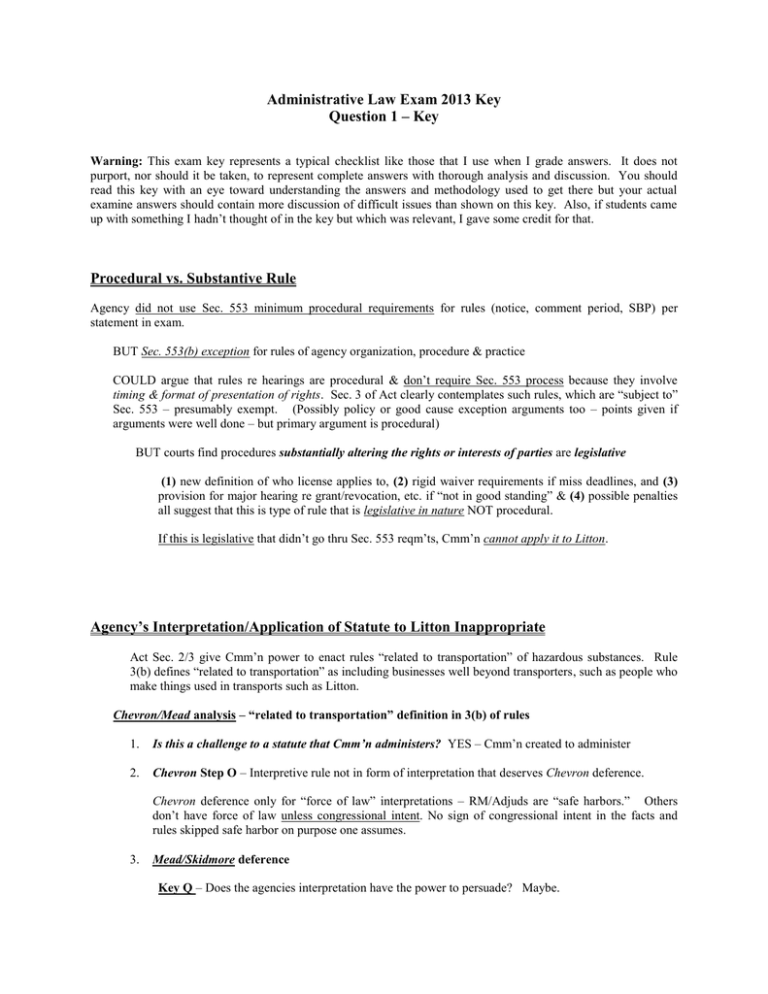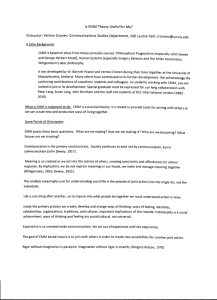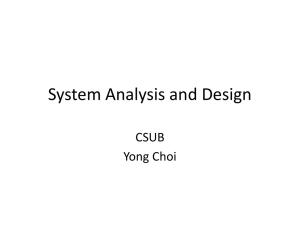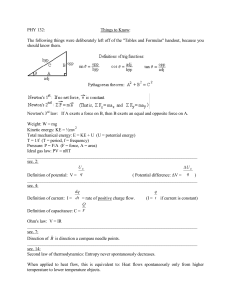Administrative Law Exam 2013 Key Question 1 – Key
advertisement

Administrative Law Exam 2013 Key Question 1 – Key Warning: This exam key represents a typical checklist like those that I use when I grade answers. It does not purport, nor should it be taken, to represent complete answers with thorough analysis and discussion. You should read this key with an eye toward understanding the answers and methodology used to get there but your actual examine answers should contain more discussion of difficult issues than shown on this key. Also, if students came up with something I hadn’t thought of in the key but which was relevant, I gave some credit for that. Procedural vs. Substantive Rule Agency did not use Sec. 553 minimum procedural requirements for rules (notice, comment period, SBP) per statement in exam. BUT Sec. 553(b) exception for rules of agency organization, procedure & practice COULD argue that rules re hearings are procedural & don’t require Sec. 553 process because they involve timing & format of presentation of rights. Sec. 3 of Act clearly contemplates such rules, which are “subject to” Sec. 553 – presumably exempt. (Possibly policy or good cause exception arguments too – points given if arguments were well done – but primary argument is procedural) BUT courts find procedures substantially altering the rights or interests of parties are legislative (1) new definition of who license applies to, (2) rigid waiver requirements if miss deadlines, and (3) provision for major hearing re grant/revocation, etc. if “not in good standing” & (4) possible penalties all suggest that this is type of rule that is legislative in nature NOT procedural. If this is legislative that didn’t go thru Sec. 553 reqm’ts, Cmm’n cannot apply it to Litton. Agency’s Interpretation/Application of Statute to Litton Inappropriate Act Sec. 2/3 give Cmm’n power to enact rules “related to transportation” of hazardous substances. Rule 3(b) defines “related to transportation” as including businesses well beyond transporters, such as people who make things used in transports such as Litton. Chevron/Mead analysis – “related to transportation” definition in 3(b) of rules 1. Is this a challenge to a statute that Cmm’n administers? YES – Cmm’n created to administer 2. Chevron Step O – Interpretive rule not in form of interpretation that deserves Chevron deference. Chevron deference only for “force of law” interpretations – RM/Adjuds are “safe harbors.” Others don’t have force of law unless congressional intent. No sign of congressional intent in the facts and rules skipped safe harbor on purpose one assumes. 3. Mead/Skidmore deference Key Q – Does the agencies interpretation have the power to persuade? Maybe. (1) given the purpose of the statute – to prevent hazardous substance spills, it might make sense to apply it to all materials used in transportation; (2) is also a highly technical subject; (3) It’s contemporaneous with the Act but is a bit of a change from original HMTA – whose licensing it’s tagging off of – and could be prejudicial as applied here; (4) Not clear how carefully considered since it implemented quickly with no procedures; If student also did Chevron analysis (1 – did agency give effect to clear intent of Congress? 2 – if statute is silent/ambiguous is agency interpretation reasonable?) or did Chevron instead – points were given as well. Chevron/Mead analysis – no right to a hearing under 1(c) of rules Mead/Skidmore deference - Does the agencies interpretation have the power to persuade? Not really The absolute waiver requirement for missed deadline especially applied to people who did not previously have a license MAKES NO SENSE. Cmm’n never bothers to justify it – just asserts. Hard look analysis – definition of “related to transportation” & hearing reqmt A&C under Sec. 706? Agency must give reasons & reasoned explanation for decision. The Rules Sec. 1(c) requirement of total waiver is most vulnerable here even under Scalia deferential approach. See reasons above in Mead/Skidmore for why likely to fail hard look. The “related to transportation” is less vulnerable here as there are credible reasons for why might want to expand the definition – see Mead discussion above. Due Process Violation 1. 2. 3. 4. 5. Adjudication? Yes Licensing hearings involve a relatively small number of persons who are exceptionally affected upon individual grounds because their licenses are at stake Deprivation? Yes – inability to get license & total loss of livelihood if can’t get one By the Gov=t? Yes – Cmm’n is federal agency Person? Yes Liberty/Property? Maybe a property interest in obtaining the license that he clearly needs to operate business. It isn’t clear where the requirement that he have a license comes from but the Cmm’n is asserting the reqm’t that one have such licenses so it is an important interest. Maybe claim it is a liberty/property interest in operating business since lack of license will put him under completely. More than just interest in a job (Roth) but in a particular business that will be driven under. Notice & Pre-Deprivation Opportunity to Be Heard 1. Inadequate Notice – Cmm’n didn’t identify specific new licensees; just published in trade journals & FR. Unclear that is good enough for an adjudication where entire business is at stake. 2. Pre-Dep Opp – None is provided here. Litton missed 120 day window can only be heard in court. Penalties escalate if he loses; agency could start enforcement proceedings. Waiver provision is unfair and precludes opportunity to be heard before license issue is decided for those who miss timeframe. Agency Failure to Follow Own Rules Agencies need not follow own informal procedural reqm’ts UNLESS they give public a “justified expectation” that the agency follows certain procedures. Sec. 1b says must get license w/in 12days of “publication or receipt of notice.” Implies attempt to give axl notice which wasn’t done. Cmm’n published rules in Fed Reg & trade journals so Litton can argue the public had a reasonable expectation Cmm’n would follow the procedural rules it published and court may agree (even though here Litton actually did not know – like Morton v. Ruiz). Administrative Law Exam 2013 Key Question 2 – Key Was the creation of the Commission unconstitutional? Appointments: Commissioners could be appointed by President or Sec’y. Whether that vesting is ok depends on whether commr’s are inferior officers since there is no A&C required of Senate Article II, Section 2, Cl. 2 Officers: President nominates with A&C of Senate Inferior Officers: Congress can vest appointment in (1) President, (2) Heads of Dept’s, (3) Courts Edmonds/PCAOB approach – are the cmm’rs subordinate to others (supervisor to whom they answer who is PAC appointee)? Not really – don’t answer to anyone (not clearly under Sec’y of DOT who would qualify as supervisor) & have complete rulemaking, licensing & enforcement authority even if some definitions in common w/ DOT. Also, they are not removable at will so they are not inferior officers under PCAOB. OR Morrison factors: (1) Inferior to others – Not really –above. (2) Limited Duties - Only re hazmat transportation licensing but they have complete authority over that so hard to say are limited. Can completely control policy (3) Limited Jurisdiction – Again somewhat limited but RM, adjud & enforcement authority is complete in this narrow area. (4) Limited Tenure – Tenure is limited to 5 years but that is longer than a Presidency so not sure how that matters. Removal: 1. 2. 3. 4. As independent cmmr’s, it is okay for Congress to condition their removal. Doesn’t interfere with President’s Art. II prerogatives (Hump. Exec). And this doesn’t appear to be a case of Congress engaging in exec activity (Bowsher). There is also not a dual layer of removal restriction since the Secy & Pres can appoint and they have no such restrictions on them so no PCAOB problem. But the removal issue does affect appointments (see above). Delegation: Congress must provide “intelligible principle” to guide the agency. Here the Commission’s purpose is to “authorize and oversee licenses in a manner consistent with the HTMA.” The HTMA’s objective is to “protect against risks to life, property, and the environment that are inherent in the transportation of hazardous material in intrastate, interstate, and foreign commerce.” HTMA also defined “hazardous material” so no Benzene case problem. Given SCT’s broad approach to delegation, there are no obvious delegation problems.



![Applying CMM to the World Around Us [ Coordinated Management of Meaning Theory]](http://s2.studylib.net/store/data/012010467_1-d2940c3fb45f516ffd9acdfa3cb2955d-300x300.png)
